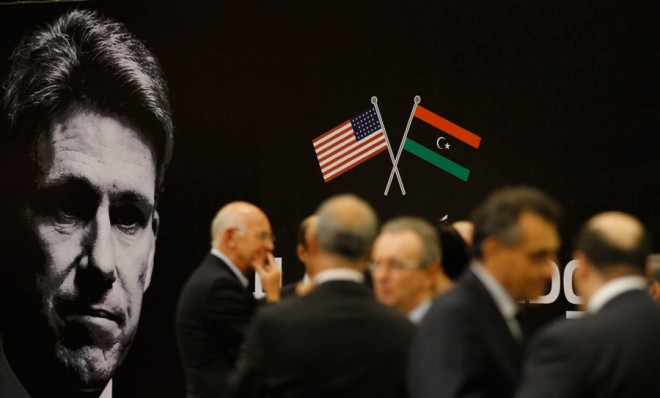3 important things we still don't know about Benghazi
A year ago today, a U.S. diplomatic outpost in Libya was attacked. Questions still linger.

A free daily email with the biggest news stories of the day – and the best features from TheWeek.com
You are now subscribed
Your newsletter sign-up was successful
The one-year anniversary of the deadly Benghazi attacks was marked by a powerful car bomb, which exploded outside Libya's Foreign Ministry on Wednesday, blasting away part of the wall but resulting in no casualties.
It's a stark reminder that all is not well in Libya. Since the fall of Moammar Gadhafi in 2011, the militia forces that brought him down have been aggressively fighting to control their country. And it was in this chaotic environment on Sept. 11, 2012, that armed men attacked the U.S. consulate in Benghazi, killing U.S. Ambassador Christopher Stevens and three other Americans.
After the attack, Republicans, led by Rep. Darrell Issa (R-Calif.), accused the White House of covering up what happened in Benghazi, and condemned officials like U.N. Ambassador Susan Rice for initially blaming the attacks on protests over an offensive film, Innocence of Muslims, instead of calling it a pre-planned terrorist attack.
The Week
Escape your echo chamber. Get the facts behind the news, plus analysis from multiple perspectives.

Sign up for The Week's Free Newsletters
From our morning news briefing to a weekly Good News Newsletter, get the best of The Week delivered directly to your inbox.
From our morning news briefing to a weekly Good News Newsletter, get the best of The Week delivered directly to your inbox.
Now, one year later, Benghazi has mostly dropped out of the news cycle, despite continued outrage from members of the GOP:
So what are these unanswered questions? Here are three.
What was the CIA doing in Libya?
In August, CNN reported that dozens of CIA agents were on the ground during the attacks in Benghazi and may have been pressured to keep quiet about their mission in Libya. Some theorized that the CIA might have been funneling weapons from Libya to Syrian rebels, an action that had not been approved by Congress. The CIA has denied those charges, but hasn't shed much light on what it was doing there.
A free daily email with the biggest news stories of the day – and the best features from TheWeek.com
Who was behind the attack?
U.S. intelligence has put the blame on several extremist groups, although it's not clear which group took the lead in the attacks. Witnesses at the scene claim they saw the flag of Islamist militia group Ansar al-Sharia. So far, no suspects have been questioned.
Ahmed Abu Khattala, founder of Abu Obaida Bin Jarra (which has ties to Ansar al-Sharia), has been the subject of a sealed U.S. indictment, but has not been arrested — even though he has been interviewed by several Western media outlets.
"CNN was able to go in and talk to one of the suspected terrorists," Rep. Jason Chaffetz (R-Utah) said last month. "How come the military hasn't been able to get after them and capture or kill the people? How come the FBI isn't doing this and yet CNN is?"
A U.S. counterterrorism official told The Washington Post that, one year later, U.S. intelligence still doesn't know "when, where and by whom the plot was hatched, and whether the Sept. 11 date was selected in advance or was a last-minute choice of opportunity."
Why wasn't the U.S. consulate prepared?
The State Department said it noticed "nothing unusual" in the area the day of the attacks, implying that the violence came out of the blue.
But The Guardian's Chris Stephen, reporting from Benghazi and Tripoli, said earlier this week that there were several warning signs that U.S. intelligence would be hard-pressed to miss, including:
- A cable saying that two militias that the embassy relied on for protection claimed they could "no longer guarantee security" for the compound two days before the attack.
- A cable from the CIA warning about copycat incidents after the U.S. embassy in Cairo was attacked.
- A rocket attack that forced the closure of the British embassy in Libya.
- Several homemade bombs that had been thrown against the consulate wall in Benghazi.
"Even as attacks in Benghazi escalated," Stephen wrote, "Washington decreased security, in line with its official position that Libya, post-revolution, was normalizing."
Keith Wagstaff is a staff writer at TheWeek.com covering politics and current events. He has previously written for such publications as TIME, Details, VICE, and the Village Voice.
-
 The 8 best TV shows of the 1960s
The 8 best TV shows of the 1960sThe standout shows of this decade take viewers from outer space to the Wild West
-
 Microdramas are booming
Microdramas are boomingUnder the radar Scroll to watch a whole movie
-
 The Olympic timekeepers keeping the Games on track
The Olympic timekeepers keeping the Games on trackUnder the Radar Swiss watchmaking giant Omega has been at the finish line of every Olympic Games for nearly 100 years